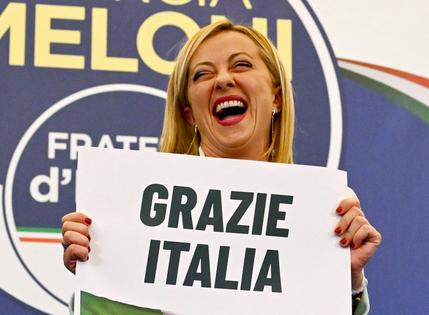‘Inflation is radioactive’: Trump’s victory is part of a global populist wave of voters throwing out incumbents
Published in Political News
Was the U.S. election the latest eruption of populism across the globe? The Conversation U.S. senior politics editor Naomi Schalit brought this question to James D. Long and Victor Menaldo, two political scientists at the University of Washington who are specialists in comparative politics. They discussed how Donald Trump’s victory mirrors a movement in advanced industrialized countries that are liberal democracies to throw incumbents out of office after a prolonged period of post-pandemic inflation.
Naomi Schalit: It looks like the price of groceries played a big part in the rejection of Kamala Harris.
James Long: The person running against the unpopular incumbent party won this election, just like the person running against the unpopular incumbent won the 2020 election. Trump was the unpopular incumbent then, and although Harris was not technically the incumbent now, she represents the incumbent party. And it’s hard to win as an unpopular incumbent.
I don’t necessarily interpret the election results as a shift in the levels of racism or sexism or xenophobia necessarily. I think it’s just that those types of things probably got packaged up into feelings about immigration policy, and perhaps even anxieties about the economy, like inflation.
Victor Menaldo: I think we learned or confirmed that inflation is radioactive and that folks have a very long memory when it comes to price increases, and they will not simply embrace a reduction in the inflation rate as much as they’ll remember that the cumulative change in the level of inflation was 20% on average since 2021. So even if inflation is trending in the right direction, in terms of its rate, it’s the accumulation of the increased cost of living that I think has a lot of bite for voters.
Schalit: You can talk about inflation being down at 2.1% but the groceries still are really expensive.
Menaldo: That you paid 20% more on average for these over three years is what matters. That affects your standard of living and your budget.
More importantly, I think the Democrats are totally and utterly out of touch. They are not a working-class or middle-class party, though they pretend to be, and they advance policy agendas that people really don’t like. I think Harris, to her credit, understood that and ran away from things like defunding the police and banning fracking, but she wasn’t able to outrun them.
Schalit: Are you seeing an echo here in the U.S. of a political phenomenon – populism – that you’ve seen elsewhere in the world?
Menaldo: The populism of our time that we’re seeing in advanced industrialized countries that are liberal democracies combines three elements. One is antipathy to experts and the cultural and political elite. It’s protectionism and isolationism, or at least nationalism, and it’s very closely related to that skepticism of, if not hostility to, immigration.
So you’re just seeing this crop up in places like Sweden, the Netherlands, France, Germany, obviously Brexit in 2016. Brexit, a populist revolt that led the U.K. to withdraw from the European Union, was an early canary in the coal mine. And the United States is not immune from that. You see the same syndrome and the same symptoms in terms of hostility to the elites, whether they’re political or cultural.
In most of these countries, left of center parties are, for whatever reason, choosing policies or chose policies that were very unpopular. And I just think it’s really that simple. Whether they’re good or bad is a separate topic. It’s about their popularity.
Schalit: After the last four years of bad news about him, indictments, convictions, all the things he says – Trump managed to ride all of that back to the White House. That’s extraordinary to me.
Long: Is it that the Democrats are so toxic or that Trump is so popular? Of course, those can both be true, and it can be different for different types of people. But I think regardless of how true it is, Democratic Party elites don’t know the answer to that question, and that means they’re going to keep losing until they can answer it for themselves. Maybe Biden knew the answer to that question in 2020, and that’s why he didn’t talk then about a lot of the things that are toxic now.
The Democrats’ inability to connect to the parts of the constituency that they won even as recently as 2020, and they should be winning, like Latino voters and African American men and younger people – I mean, they’ve lost young men – their inability to do that, whether it’s because they’re toxic or he’s popular or both, well, they have to figure out an answer to that question, and then they have to find a way to win locally and nationally.
Schalit: When you look out over the political landscape globally, what has happened in these countries where they threw out the establishment and elected a populist?
Long: I’m not sure that Trump’s thrown out the establishment. I think he’s rearranged who the establishment is. The Republican Party has stayed the same. He’s basically purged the Liz Cheneys of the party, so the party is his party. I think the role that captains of industry, like Elon Musk, will still play will be very influential, as it always is for any administration, particularly Republicans. I do think this is a huge rejection of the cultural establishment, for sure – journalists, academics, NGOs, people online, you know, kind of the mainstream media. I think this is a huge rejection of them and their wisdom and their whatever they think their insights are.
Menaldo: In terms of other countries, it’s a mixed bag. It’s varied, like after Brexit and Tory leader Boris Johnson’s short honeymoon period, everything went south for the Conservative Party, and they look now like they are dead in the water. They’re a spent political force.
If you think about France, because of their electoral system, even though the right did well, there was a coalition against populism of the center and the left, and so they’ve held that at bay. We’ll see if that dam breaks. If you think about a place like Italy, Giorgia Meloni seems to have moderated a lot of her populism and co-opted a lot of the establishment, or maybe the establishment found the way to accommodate her.
If you look at Sweden, the Netherlands and Germany, where center-left parties have been humbled, it’s also mixed. In these cases, you have populism in advanced industrialized democracies with pretty healthy checks and balances and still-relevant opposition parties and free media and stuff like that. I don’t think the populists were able actually to vanquish their foes and be as successful as they might have wanted to be.
But if you think of Viktor Orban in Hungary or Recep Tayyip Erdogan in Turkey, those are examples where they change things fundamentally toward illiberal democracy. So those are examples of a lot of populist success. If you consider Narendra Modi in India, or a lot of the Latin American populists – for example, Hugo Chavez or Nicolás Maduro, or even the earlier ones like Juan Peron – those populists also did quite well. But those are developing countries, and democratic institutions and civil society and economic pluralism was less pronounced, so it’s difficult, I think, to analogize to those places. And in India, Modi has been strongly challenged and beaten back.
Similarly, Trump is constitutionally prevented from running again, so this is the beginning of the end for him. And he’s 78. So he’s a lame-duck, old president.
James: Even so, does the Trumpist message carry past 2028, or will Democrats be in a position again to throw the rascals out?
This article is republished from The Conversation, a nonprofit, independent news organization bringing you facts and trustworthy analysis to help you make sense of our complex world. It was written by: James D. Long, University of Washington and Victor Menaldo, University of Washington
Read more:
What should journalists do when the facts don’t matter?
Trump’s prosecution is unprecedented in US – but other countries have prosecuted former leaders
Could Trump turn his politics of grievance into a get-out-of-jail card? Neither prosecution nor even jail time has prevented former leaders in Israel, Brazil and Kenya from mounting comebacks
The authors do not work for, consult, own shares in or receive funding from any company or organization that would benefit from this article, and have disclosed no relevant affiliations beyond their academic appointment.


































































Comments